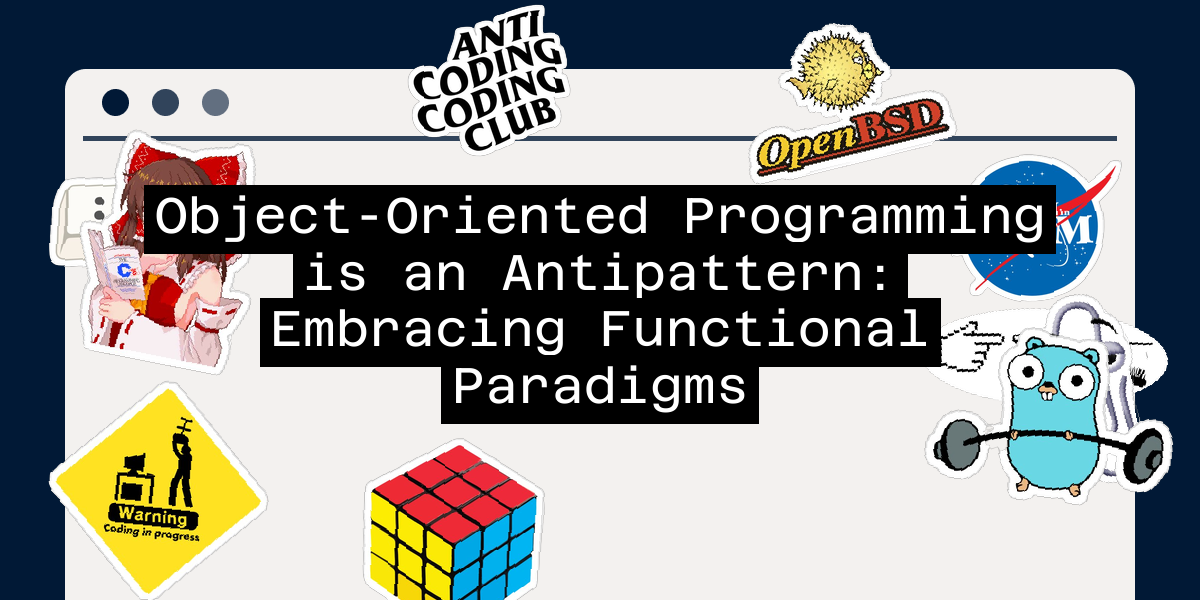Introduction to the Debate
The debate between Object-Oriented Programming (OOP) and Functional Programming (FP) has been ongoing for years, with each side having its own set of advocates and detractors. While OOP has been the dominant paradigm for decades, there is a growing sentiment that it might be an antipattern, especially when compared to the elegance and simplicity of functional programming. In this article, we will explore why some developers believe OOP is an antipattern and how functional paradigms can offer a more streamlined and efficient approach to software development.
The Problems with OOP
Over-Engineering and Complexity
One of the primary criticisms of OOP is that it often leads to over-engineering. The use of inheritance, polymorphism, and encapsulation can result in complex class hierarchies that are difficult to maintain and understand. This complexity can lead to a higher likelihood of bugs and make the codebase harder to navigate.
For instance, the Functional Decomposition AntiPattern highlights how developers familiar with procedural programming may misuse OOP principles, creating a mess of classes that resemble functions rather than objects. This results in a degenerate architecture that misses the point of object-oriented design entirely.
Shared State and Coupling
Another issue with OOP is the inherent coupling between objects due to shared state. When objects communicate with each other, they often share state, which can lead to tight coupling and make the system harder to modify or extend. This is particularly problematic because it violates the principle of single responsibility, making it difficult to isolate and test individual components.
The Advantages of Functional Programming
Simplicity and Modularity
Functional programming, on the other hand, offers a more straightforward and modular approach. By focusing on pure functions that take input and produce output without side effects, FP avoids the complexity and coupling inherent in OOP. This makes the code easier to reason about, test, and maintain.
For example, the Strategy Pattern, which is a common design pattern in OOP, becomes much simpler in FP. Instead of defining multiple classes that implement a common interface, you can simply pass functions as parameters. This reduces the amount of code and eliminates the need for complex class hierarchies.
Design Patterns in FP
Many design patterns that are crucial in OOP become either unnecessary or much simpler in FP. The Singleton Pattern, for instance, is completely unnecessary in functional programming because there is no global state to manage. Functions exist in a global namespace and are always accessible, taking input and producing output without affecting the outside world.
Practical Examples
Implementing the Strategy Pattern in FP
To illustrate the simplicity of FP, let’s consider an example of implementing the Strategy Pattern in JavaScript:
const strategy1 = () => {
console.log('Run strategy 1');
};
const strategy2 = () => {
console.log('Run strategy 2');
};
const consumer = (runStrategy) => {
// Do other stuff
runStrategy();
};
const selectedStrategy = condition ? strategy1 : strategy2;
consumer(selectedStrategy);
In this example, we define two strategies as simple functions and pass the selected strategy to the consumer function. This approach is much more concise and easier to understand compared to the OOP equivalent, which would involve defining classes and interfaces.
Conclusion
While OOP has its place in software development, the criticisms against it are valid. The tendency towards over-engineering, shared state, and tight coupling can make OOP codebases difficult to manage. Functional programming, with its focus on pure functions and immutability, offers a cleaner and more modular alternative.
As developers, it’s important to be open to different paradigms and to choose the best tool for the job. By embracing functional programming, we can write more maintainable, scalable, and efficient code. Whether you’re a seasoned developer or just starting out, exploring functional programming can significantly improve your approach to software development.
Final Thoughts
The debate between OOP and FP is not about which paradigm is inherently better but about which one is more suitable for a given task. By understanding the strengths and weaknesses of each, we can make more informed decisions about how to design and implement our software systems.
In the end, the goal is to write code that is easy to understand, maintain, and extend. If functional programming can help us achieve this goal more effectively, then it’s certainly worth considering as a viable alternative to traditional OOP practices.
